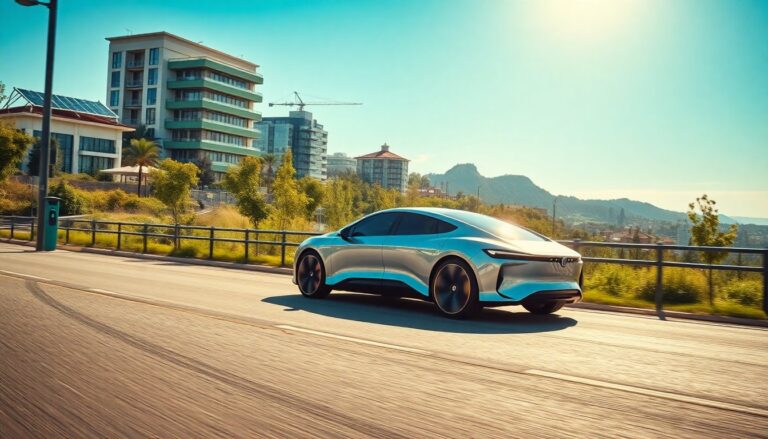Argomenti trattati
Transforming the automotive industry
The automotive industry is experiencing a significant shift as emerging technologies and changing consumer demands come to the forefront. Advanced technologies are not only improving vehicle performance but also transforming the entire driving experience. This article examines the key trends and innovations that are defining the future of automotive technology.
When exploring automotive advancements, it is vital to understand the importance of sustainability and smart technologies. These factors are increasingly essential for meeting the expectations of today’s consumers while tackling the urgent challenges presented by climate change.
Electric vehicles: driving the change
One of the most significant trends in the automotive sector is the rise of electric vehicles (EVs). As environmental concerns mount and battery technology improves, EVs are capturing the interest of consumers globally. These vehicles provide a cleaner alternative to traditional gasoline-powered cars, resulting in a notable reduction in carbon emissions.
The global push for sustainability is gaining momentum through government incentives and regulations that promote EV adoption. Many countries are establishing ambitious targets to phase out internal combustion engines. This shift is prompting manufacturers to invest significantly in electric technology.
Advancements in battery technology
Battery technology stands as a cornerstone of the electric vehicle revolution. Recent innovations, including solid-state batteries and fast-charging solutions, enhance the practicality of electric vehicles (EVs) for everyday use. Solid-state batteries offer higher energy densities and improved safety compared to traditional lithium-ion batteries. This advancement could lead to longer driving ranges and reduced charging times.
Additionally, the emergence of ultra-fast charging networks tackles one of the primary obstacles to EV adoption: range anxiety. As charging stations become more widespread and accessible, consumers are increasingly likely to consider transitioning to electric vehicles.
Autonomous driving: the new frontier
The automotive industry is witnessing a significant shift with the rise of autonomous driving technology. Self-driving cars are not just a concept; they are becoming a reality that excites both consumers and manufacturers. This technology has the potential to transform travel, enhancing road safety and efficiency.
Leading the charge in this innovation are companies like Waymo and Tesla. These firms are developing advanced autonomous systems that rely on a blend of sensors, cameras, and artificial intelligence. This combination allows vehicles to navigate intricate environments and make real-time decisions while driving.
Safety and regulations
As autonomous technology evolves, ensuring safety remains paramount. Manufacturers must conduct extensive testing to confirm the reliability of their systems. Furthermore, regulatory frameworks are being established to oversee the deployment of autonomous vehicles on public roads. These regulations are crucial for fostering public trust and acceptance of this technology.
Additionally, advancements in vehicle-to-everything (V2X) communication enable autonomous vehicles to interact with other vehicles and infrastructure, significantly enhancing safety and traffic management.
Connected cars: embracing the digital era
The concept of the connected car represents a significant shift in the automotive industry. These vehicles feature internet connectivity and various sensors, enabling communication with other devices and systems. This connectivity facilitates a wide array of functionalities, such as real-time traffic updates and remote diagnostics.
Connected cars improve the driving experience by delivering essential information to drivers, enhancing navigation, and providing personalized services. For instance, infotainment systems now seamlessly integrate with smartphones, granting users access to their favorite apps and music while on the move.
Data privacy and security
The rise of connected vehicles presents notable challenges, particularly in the realms of data privacy and security. As vehicles increasingly gather extensive user data, manufacturers must prioritize the implementation of robust measures to safeguard this information against potential breaches. Transparency and consumer trust are essential for the successful adoption of connected technologies.
Looking ahead, the automotive technology landscape appears promising. Innovations such as electric vehicles, autonomous driving, and connected cars are at the forefront of this transformation. As these advancements progress, they hold the potential to enhance safety, sustainability, and the overall driving experience. The automotive industry is on the verge of a significant shift, making it crucial for stakeholders to embrace these developments for a successful transition.

